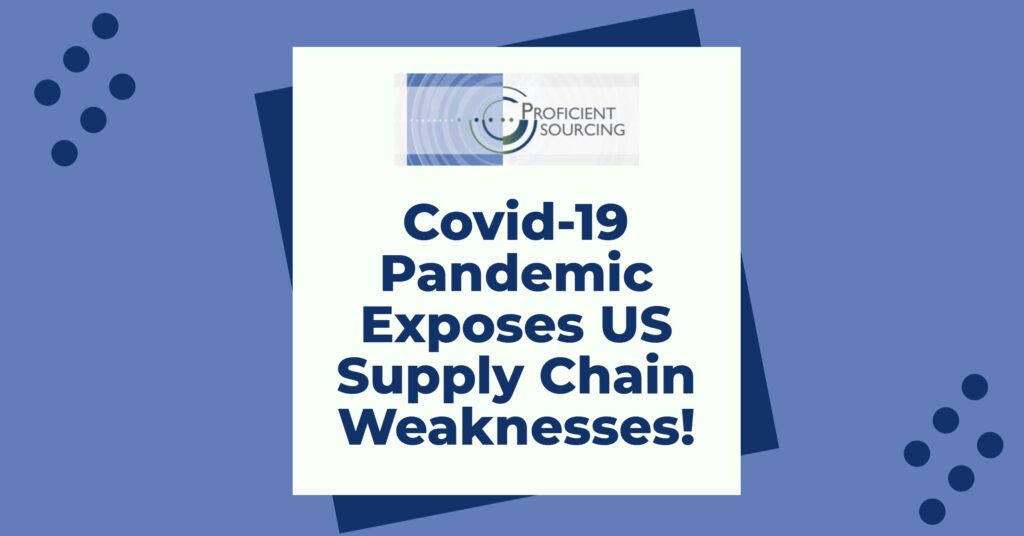
We have tried to stay tuned to global supply chain developments, especially the US relationship with China during the Covid-19 pandemic as it exposes more weaknesses. With most sophisticated OEM’s supply chains linked to some non-American source, such developments could have colossal effects for years to come.
This sounds like an incredibly difficult diplomatic situation. How this turns out could have major effects on our supplies from China, and also other countries affected by the US-China relationship. At the extreme, could China impose “punishment” on countries that increase US business at the expense of China? Time will tell.
Anyway, supply chains are an area of particular interest. We don’t know the exact status of Chinese manufacturers, but it’s doubtful that supplies coming from China will be happening as they were just a few months ago. If components of your products are in jeopardy, maybe we can help: https://www.proficientsourcing.com/capabilities/.
A recent article at Foreign Policy discusses this Chinese “decoupling” in some detail. Some examples:
“For the more hawkish members of the Trump administration, undoing 40 years of ever-closer economic relations with China and rolling back U.S. reliance on Chinese factories, firms, and investment was always the end game of the endless trade war—even before the coronavirus pandemic turbocharged Washington’s desire to disentangle itself from what many view as a dangerous economic bear hug. Now, lawmakers and administration officials are mulling a raft of measures to cleave parts of the two largest economies in the world: Bans on a wide variety of sensitive exports, additional tariffs on Chinese goods, forced reshoring of U.S. companies, even pulling out of the World Trade Organization altogether, which is seen by some as facilitating China’s so-called economic imperialism.”
“It’s not just economic ties between China and the United States that are in danger. Europe, too, is increasingly talking of rolling back the deep trade and investment ties it has developed with Beijing in recent decades (even as it is cutting trade ties with itself, as the United Kingdom leaves the European Union). Other countries are also pulling up the drawbridges—all leery that today’s unprecedented level of economic integration has gone too far, bringing more pain and less gain.”
“Now, Trump administration officials talk of rolling out a concept called the “Economic Prosperity Network” of like-minded countries, organizations, and businesses. The aim is in part to convince U.S. firms to extricate themselves from China and instead partner with members of the so-called network to reduce U.S. economic dependence on Beijing—seen as a key national security vulnerability. If a U.S. manufacturing company can’t move jobs from China back to the United States, for example, it could at least move those jobs to another more U.S.-friendly country, such as Vietnam or India.”
Yet, all is not negative. Later, Foreign Policy reported this:
“China’s quest to bolster its own capacity for innovation and to become a leader in advanced technologies relies on easy access to firms and researchers around the world, and it doesn’t want to see those connections severed entirely. At the same time, with an already-slowing economy hammered by the pandemic this year, China will likely do what it can to ease the economic tensions with the United States—like trying to appease Trump by adhering to the goals of the phase-one trade deal reached in January, for example.”
“The economy has been deeply damaged by the coronavirus crisis and, prior to that, damaged somewhat by the trade war,” Rudd [Kevin Rudd, a former Australian prime minister and well-known China scholar} said. “So I think the predisposition of Beijing at present to try to restabilize that economic relationship because China is still not strong enough to sail alone.”
So: what does all this mean to us? If your supply chain directly involves China, you are doubtless paying very close attention. But even if you are not one of those, it is pretty clear that all of us will be affected one way or another by the major trade changes lurking on the near horizon. And once again, Proficient Sourcing stands ready to help with your outsourcing needs for metal and plastic parts and assemblies. Just give us a call or text: (513) 489-5252. We’re ready whenever you are.

